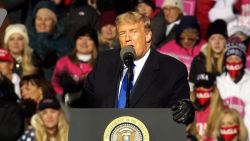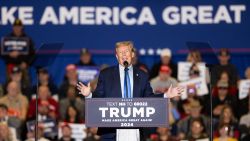Editor’s Note: Sign up to get our new weekly column as a newsletter. We’re looking back at the strongest, smartest opinion takes of the week from CNN and other outlets
Within a few hours last week, two pillars of the Trump White House shook.
On Thursday, President Donald Trump revealed that press secretary Sarah Sanders is leaving to return to Arkansas. And his adviser Kellyanne Conway’s fate was put into question when a federal agency wrote to Trump urging she be fired for repeated violations of the Hatch Act’s prohibition on federal employees using their official positions to dabble in politics.
Apart from Trump himself, Sanders and Conway have been the most prominent White House voices explaining and defending the President’s actions.
How well did Sanders do at this? Joe Lockhart, who held the same job during part of President Bill Clinton’s second term, was unsparing: “She has failed in almost every aspect of the job.”
He faulted her for effectively killing the daily White House briefing, failing to advocate for a transparent government and inventing the story that FBI staffers were unhappy with fired Director James Comey’s leadership. But Alice Stewart, a Republican consultant, insisted that Sanders’ troubles in the White House don’t define her and wouldn’t stop her from a successful run for governor of Arkansas, should she choose that path.
Trump said he’s going to keep Conway on the job, defying the US Office of Special Counsel’s report that cited her repeated verbal attacks, while in her White House role, on Democratic candidates. Jill Filipovic wrote that Conway belongs to a group of administration officials who have been accused of breaking the rules and haven’t yet paid a price: “The use of public office as a mechanism for enriching oneself, bettering the position of one’s allies or associates or protecting oneself from the law did not start with the Trump administration, but this President and his associates have brought it to levels previously associated with gilded dictators and greedy, gaudy tyrants.”
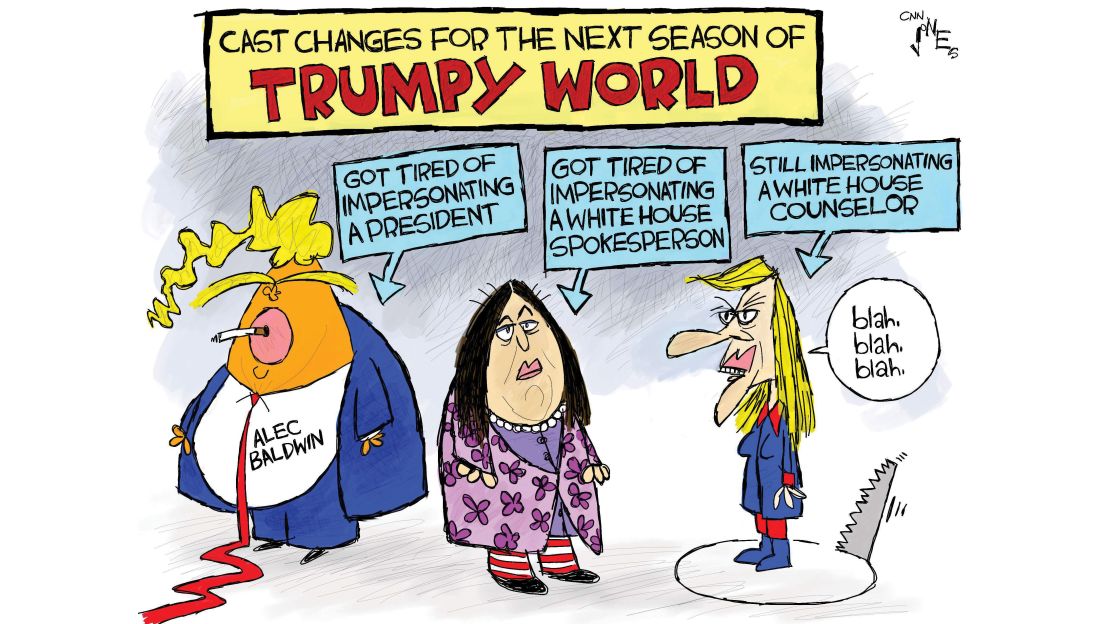
‘Too thin-skinned’
In a 52-year career in journalism, Sam Donaldson had his share of run-ins with presidents and press secretaries (Jimmy Carter’s spokesman threw a glass of red wine at him), but the veteran ABC News White House correspondent said the Trump White House is different. “We have never seen a president like Donald J. Trump, whose disdain, even contempt and apparent hatred for many members of the press is almost daily on display.”
Writing about CNN White House correspondent Jim Acosta’s new book, “Enemy of the People,” Donaldson called Trump’s attacks on the press wrong and dangerous. “History shows that tyrants and would-be tyrants always attempt to destroy a free press. And that is why the First Amendment to our Constitution specifically forbids government from interfering with the work of the press.”
The First Amendment’s protection of free expression includes comedy. But that doesn’t mean Trump likes what he hears on “Saturday Night Live” – and he has been a particular critic of Alec Baldwin’s impression of him.
Baldwin said recently he doesn’t plan to appear as Trump on future shows. Dean Obeidallah attributed that, at least in part, to Trump’s relentless attacks on the actor. “Comedy has long been used in America to expose the faults of people in power, especially presidents. We cannot allow comedy to be silenced or infringed upon in any way simply because Trump is too thin-skinned to take a joke.” (Obeidallah’s column – “Alec Baldwin’s ‘SNL’ departure is a win for Trump”– prompted a tweet from Baldwin: “Wait! Wait! If pissing off Trump is the point, then I’ll keep doing it! I’ll keep doing it!!”)
The internet’s boyfriend

Peggy Drexler weighed in on the renewed popularity of Keanu Reeves, who gained plaudits for making sure not to touch women when posing for pictures with them. “Twitter fans are officially hailing Reeves as their ‘respectful king,’ a man who is taking the lessons of #MeToo to heart. Many have suggested he can serve as a role model for other men confused about what respect for women’s personal space looks like in platonic settings,” Drexler wrote. There could be many reasons why Reeves is so careful, she said, but little doubt that “it’s never a bad idea to be mindful of another person’s personal space, whether female or male.”
Four-letter word
Dirt – a compact word, derived from the Old Norse term for excrement – made a lot of headlines last week. It was shorthand for what Trump called “oppo research,” the information that candidates obtain about their election rivals.
Asked by ABC’s George Stephanopoulos if he would be open to hearing dirt on his opponents from foreign governments, the President said there’s nothing wrong with listening, and questioned whether he would necessarily report the offer to the FBI. (On Friday, he changed his stance, saying in a Fox News interview, “Of course, you have to give it to the FBI or report it to the attorney general or somebody like that.”)
Many were shocked by Trump’s initial comments. Larry Noble, the former counsel to the Federal Election Commission, said there is no doubt – soliciting or accepting such information from a foreign government is illegal, and he faulted Robert Mueller for not charging Trump campaign officials in connection with the famous June 2016 Trump Tower meeting.
“By putting a ‘for sale’ sign on his forehead – and indicating that he’s open for business when it comes to receiving dirt on his political rivals – President Donald Trump is encouraging foreign governments to attack his political opponents,” Samantha Vinograd wrote.
This is precisely what the Founding Fathers feared, John Avlon wrote: They “were obsessed with foreign nations interfering with our elections and influencing our domestic debates. And it wasn’t a naive or paranoid concern – it was rooted in their understanding of how democratic republics had been undermined throughout history.”
SIGN UP TO GET OUR NEW WEEKLY COLUMN AS A NEWSLETTER.
A warning for Biden
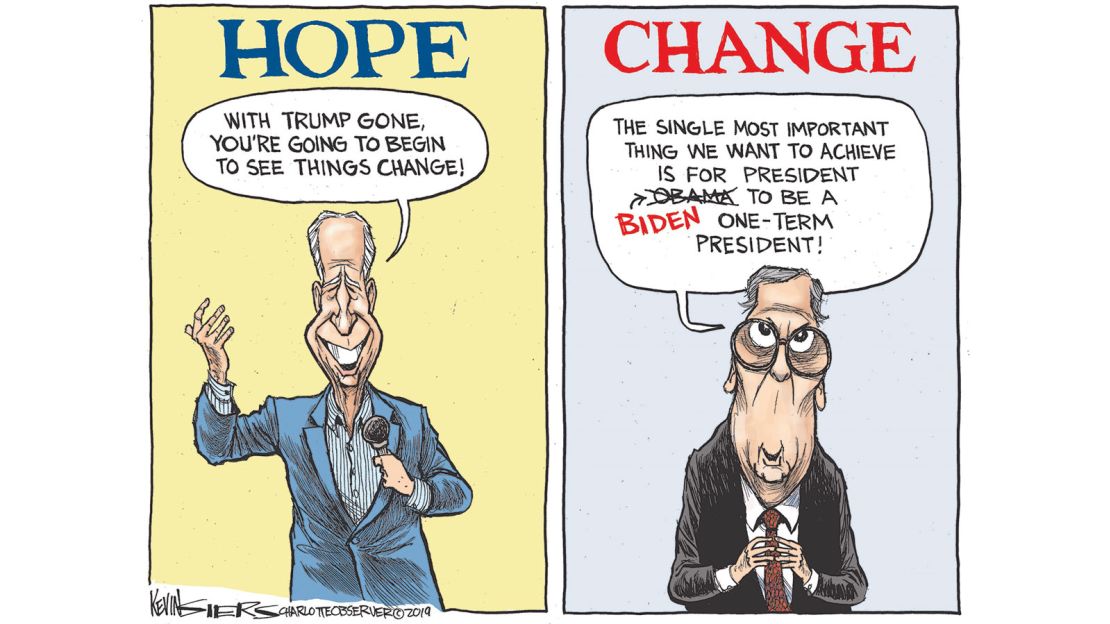
Less than two weeks before the first Democratic 2020 debates, Joe Biden still leads in polls, but he’s not on a glide path to the nomination, David Axelrod wrote. The former vice president’s stumble over his position on the Hyde Amendment, combined with a “Rose Garden” strategy that has kept him aloof from mixing it up with his rivals, raised questions about the solidity of his lead. “No one is going to hand Biden the Democratic nomination. He’ll have to engage fully and fight for it if he is to get the face-off with Trump he is seeking,” Axelrod said.
But while opponents poring over Biden’s four-plus decades in politics for vulnerabilities have found quite a few, there may not be huge reason for concern on the candidate’s part, Michael D’Antonio wrote. “We have a President who was elected despite a huge raft of controversies over his past. There have been bankruptcies. Multiple divorces. Sexual harassment accusations. None of it seemed to matter to his supporters. …Trump has paved the way for politicians to withstand criticism and controversies that may have been disqualifying in the past.”
The 13-0 US women’s victory
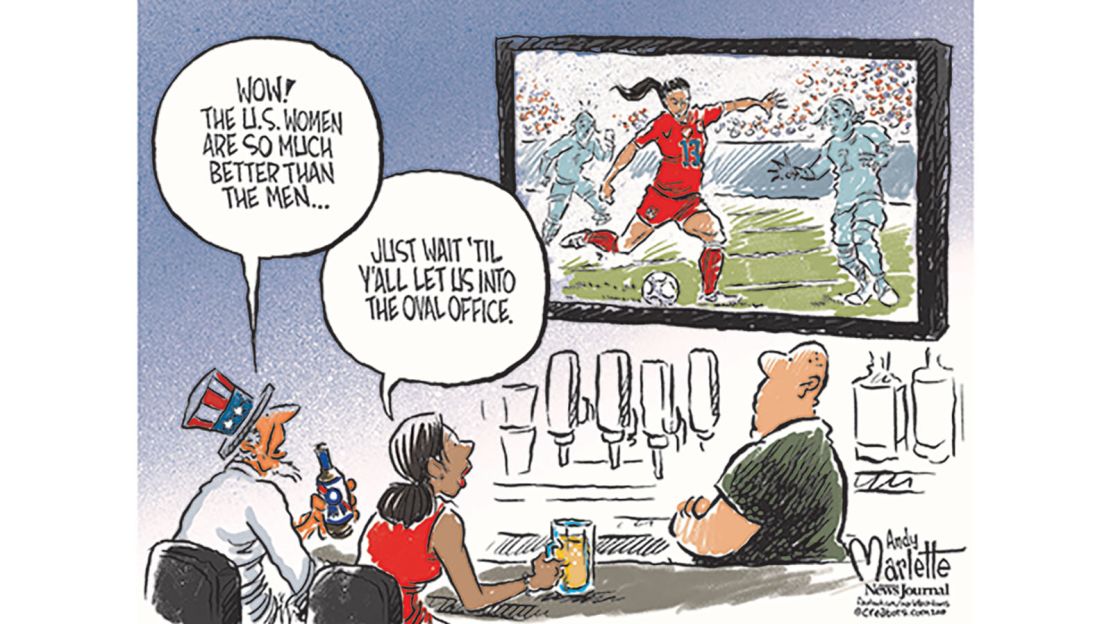
The US women’s national soccer team scored 13 goals in its shutout victory over Thailand, setting a World Cup record – and drawing scorn from some for its members’ exultation. Amy Bass was exasperated: The US women’s team has faced battles from the beginning – “shorter fields, shorter games and smaller balls. And incredibly, they get paid less to win more than the US men’s side. Flash-forward to Tuesday: Now they score too much, and when they score, they celebrate too loudly. Anyone ever questioned Lionel Messi (or any other male soccer legend for that matter) on that?”
World on edge
Images of a tanker on fire in the Gulf of Oman said it all. Tension between Iran and the United States (along with its ally Saudi Arabia) rose to a new, worrying level. Peter Bergen warned of “a combustible mix that could be the spark for a wider regional war arising out of the rivalry between Iran and Saudi Arabia – unless steps are taken to lower the tension.”
On Tuesday Trump touted a “beautiful letter” he said he received from North Korean leader Kim Jong Un (one official described it as a birthday greeting for the US President), but there was no sign of progress on Kim’s nuclear program. Former National Security Council official DJ Rosenthal, who served in the Obama administration, suggested there might be an upside to Trump’s mercurial handling of foreign policy.
“President Trump’s incompetence in foreign relations, while not a cure-all, can moderate the damage that he might otherwise cause. The more exposure the world has to this President, the less he matters.” While traditionally a President’s words are given great weight, Trump’s comments “are heavily discounted by the world.”

Trade wars are an exception. In the Perspectives section of CNN Business, Dan K. Eberhart, the chief executive of a US oilfield services company, wrote, “With no end in sight in the tit-for-tat trade war, companies must turn to lower-cost nations in Asia and the Americas to find alternative suppliers. The problem is that it is becoming increasingly difficult to find a nation that is not also a target of President Trump’s tariff stick.”
That’s dangerous, warned the editors of The Economist: “When Donald Trump arrived in the Oval Office he promised to restore America’s might. His method has turned out to be a wholesale weaponisation of economic tools. The world can now see the awesome force that a superpower can project when it is unconstrained by rules or allies.”
Don’t be too hasty to criticize the wielding of America’s economic power, wrote Marc A. Thiessen in The Washington Post, crediting Trump for Mexico’s actions to limit the flow of Central American refugees to the US southern border. He observed: “The president deserves credit for forcing a reluctant Mexican government to act. He was able to do so because the administration in Mexico City knew he was willing to pull the tariff trigger.”
High-heel sneakers?
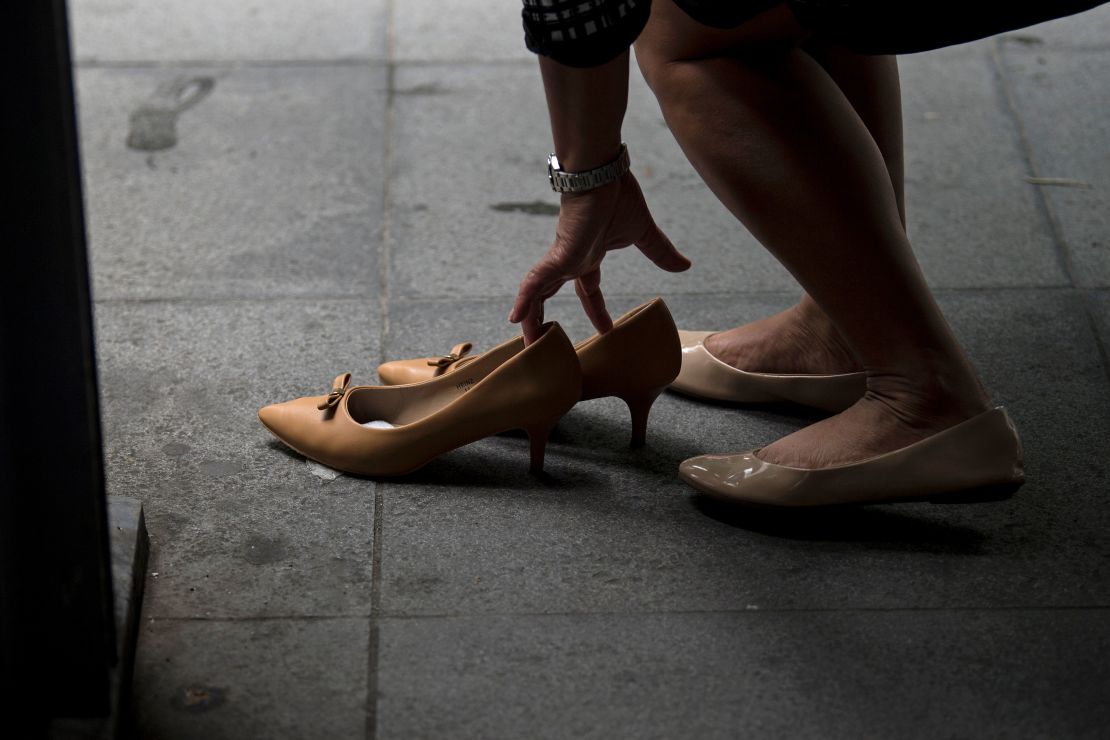
Holly Thomas has “mixed feelings” about wearing high heels at work. “As a relatively short person (I’m 5 feet, 3 inches tall), I can testify that heels can be a genuine asset when trying to assert authority. They’re often the difference between looking up at a boss who already infantilizes you or looking them in the eye.” Still, she sides with the nearly 20,000 people in Japan who signed a petition against dress codes that require women to wear heels at work.
Heels “mildly incapacitate you. They make you swing your hips and walk more slowly,” and give you “bunions, back problems, ankle sprains and tight calves” – which helps explain why a University of Alabama at Birmingham study found 123,355 people sought treatment at US emergency rooms for high heel-related injuries over a decade.
Don’t miss these:
Kate Maltby: Justice Brett Kavanaugh wants us to know he’s won
Dorothy Brown: The real reason Trump won’t put Harriet Tubman on $20 bill
Dean Obeidallah: How I won a $4 million judgment against the neo-Nazis
Swanee Hunt: What happens when women rule
John R. Dunne: Trump administration’s case for census citizenship question is bogus
Marc Benioff and Marco Lambertini: We’re failing the world’s oceans
Alvin Y.H. Cheung: Why Hong Kong protesters are outraged by extradition bill
Jamie Metzl: Ironman deaths and the risks we take
Happy Dads’ Day
As Americans celebrate Father’s Day, Nara B. Milanich is out with a new book on “Paternity: The Elusive Quest for the Father.” Paternity, she wrote, was long seen as “an intractable problem. Whereas the mother can be known at the moment of birth, the father, it is said, is always uncertain. DNA testing is actually a very recent historical invention – it only emerged in the 1980s.” But the quest for something like it began a lot earlier. In 1921, a San Francisco doctor named Albert Abrams introduced “a machine called the oscillophore that claimed to verify parentage through electronic blood vibrations.” Nonsense, of course, but Abrams anticipated “the commercial strategies associated with the modern genetic testing industry: for $10, a patient could mail a drop of blood on white blotting paper for analysis in his lab in San Francisco.”
Today’s DNA-based tests are a little more expensive – and may be a lot more reliable.













